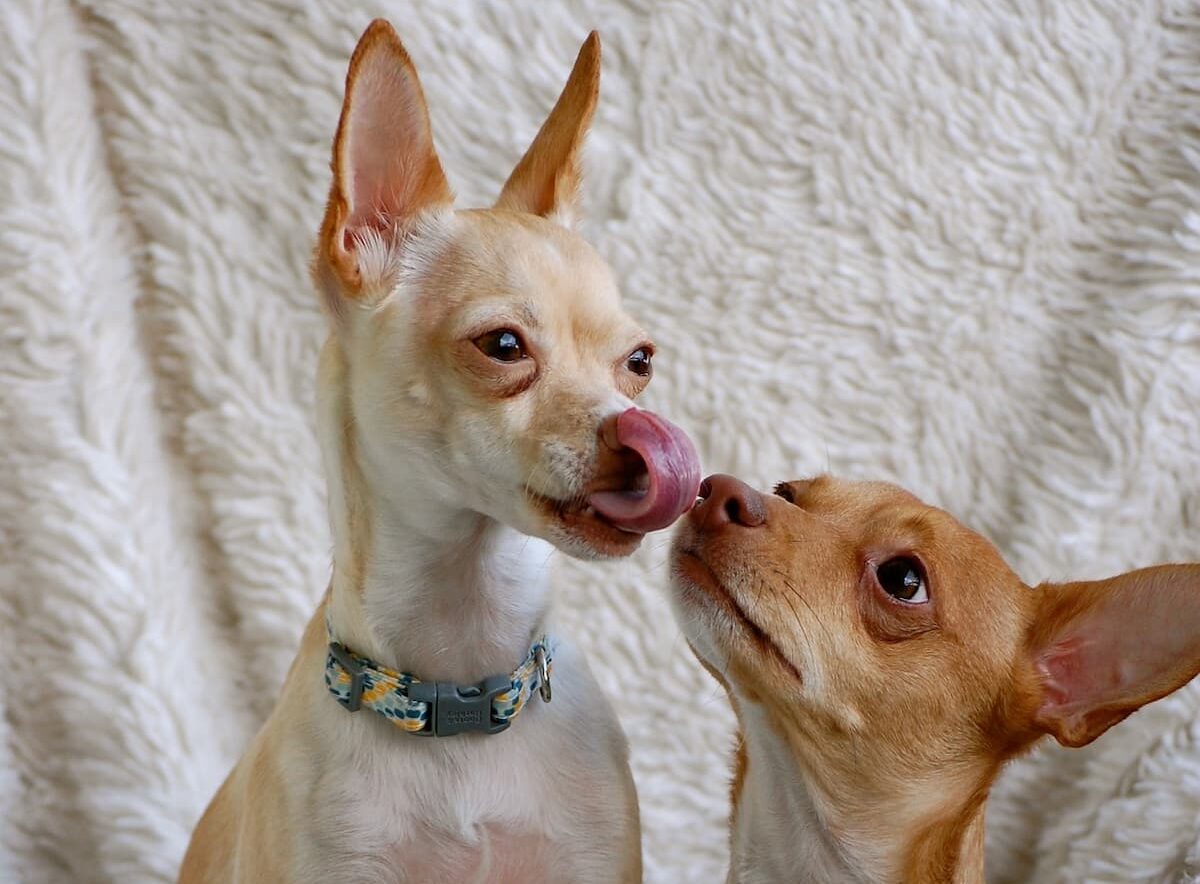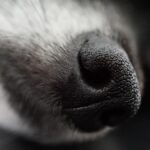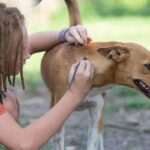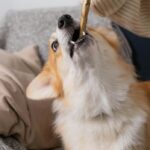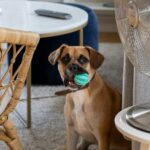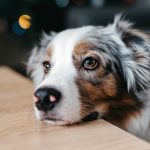Has your dog ever licked a bleeding wound on your body?
Have you ever wondered why on earth do dogs have this inexplicable affinity for licking our wounds?
This article shall answer your questions.
Why Do Dogs Like Licking Wounds?
Pets have always held a special place in our hearts, providing us companionship and unconditional love.
A common sight when our furry friends get hurt is the immediate instinct to lick their wounds.
It may seem strange to us, but there is actually a deep-seated canine instinct behind this behavior.
Here are some scientific reasons behind this behavior and how it benefits our dogs:
1. Relieving Pain and Promoting Healing
When a dog licks a wound, their saliva acts as a natural disinfectant, cleaning the area and removing any dirt or debris.
The licking action also stimulates blood flow to the wound, delivering oxygen and nutrients to accelerate the healing process.
So, next time you catch your furry friend licking their wounds remember that they’re actually aiding their own recovery.
2. Seeking Comfort and Relaxation
Dogs are highly sensitive creatures that find comfort in routine actions.
Licking is a self-soothing behavior that helps them relax and feel calm.
Similar to how humans may comfort themselves by biting their nails or twirling their hair, dogs find solace in the repetitive motion of licking.
It helps to reduce their stress levels and can even provide a sense of security, similar to a child sucking their thumb.
So, when your pup is giving themselves a little tongue bath, it’s their way of finding tranquility and peace.
3. Expressing Affection and Strengthening Social Bonds
Dogs are social animals and use their senses to communicate with their human companions and fellow canines.
Licking is one of the ways they express affection and strengthen social bonds.
A dog may lick their owner’s wounds as a way to show empathy and care, much like how we might hold someone’s hand to comfort them.
It’s their way of saying, “I’m here for you, and I want to make you feel better.”
So, when your furry friend gives your scratches a lick, take it as a sign of their love and loyalty.
Pros and Cons of Dogs Licking Wounds
Pros:
Natural Antiseptic: Believe it or not, a dog’s saliva contains natural enzymes that can help disinfect minor wounds.
These enzymes help to break down bacteria and cleanse the wounded area, promoting faster healing.
Additionally, a dog’s saliva also contains a protein called histatin, which has antimicrobial properties.
So, in some cases, allowing your dog to lick a small scrape or cut might actually be beneficial.
Pain Relief: When dogs lick a wound, it releases endorphins – the feel-good hormones.
This natural pain relief can provide some comfort to your furry friend, especially if the wound is itchy or uncomfortable.
However, it’s essential to remember that excessive licking can lead to further irritation and delays in healing, so moderation is key.
Cons:
Spreading Infection: While a dog’s saliva can have antimicrobial properties, it can also introduce bacteria into an open wound.
This can be particularly dangerous if the wound is deep or severe, as it increases the risk of infection.
Moreover, certain bacteria present in a dog’s mouth, such as Pasteurella, can be harmful to humans, especially those with compromised immune systems.
So, it’s crucial to be cautious and consider seeking medical attention for more serious wounds.
Irritation and Delayed Healing: Although a dog’s saliva has some potential benefits, excessive licking can do more harm than good.
The constant moisture and rough texture of a dog’s tongue can lead to skin irritation and disrupt the natural healing process.
Excessive licking can also remove newly formed scabs, hindering wound closure and potentially causing further complications.
Therefore, it’s essential to strike a balance and discourage excessive licking by using deterrents or keeping the area covered.
So, while it may seem cute or instinctual for dogs to lick our wounds, there are both pros and cons associated with this behavior.
Ultimately, monitoring your dog’s licking behavior and seeking veterinary advice when necessary will ensure the best care for both you and your furry friend.
Guidelines and Tips for Managing Wound Licking
Although licking wounds can offer some benefits, it’s essential to manage this behavior to ensure your dog’s health and healing.
If your four-legged friend is constantly licking a wound, it can hinder the recovery process or even worsen the injury.
To help you tackle this issue, here are a few tips to keep in mind:
Distract and redirect: Engage your dog in activities or playtime to divert their attention away from the wound.
Offer them a chew toy or treat puzzle to keep them occupied.
Keep it clean and protected: Cleanse the wound gently with mild antiseptic solutions recommended by your vet.
Covering the wound with a bandage or applying an appropriate wrap can discourage licking and provide protection.
Monitor and discourage excessive licking: If you notice your dog excessively licking a wound, calmly interrupt the behavior with a firm “no” or a gentle tap on their nose.
Gradually train them to understand that licking wounds is not acceptable.
If you notice your furry companion incessantly licking a wound or if the wound shows signs of not healing properly, it’s crucial to seek veterinary assistance.
Persistent licking can delay the healing process by removing the protective scab, opening the wound to infection.
Veterinary professionals can provide the necessary intervention to ensure proper healing and prevent any potential complications.
Remember, it’s always better to be safe than sorry when it comes to your pet’s health.
So, if you ever find yourself questioning whether your dog’s wound needs professional attention, don’t hesitate to consult your vet.
They will be able to assess the situation, provide appropriate guidance, and ensure that your furry friend receives the best care possible.
After all, your pet’s well-being is worth every effort to seek the right assistance when needed.
FAQ
Q: So, why exactly do dogs love to lick wounds?
A: Well, there isn’t a single answer that fits every situation, but let’s explore a few possible explanations.
Firstly, dogs have saliva that contains certain enzymes, such as lysozyme, that possess antibacterial properties.
This means that licking might assist in cleaning the wound and preventing infection.
Q: That’s fascinating!
But what about their instinctual behavior?
A: Ah, yes!
Dogs have an innate instinct to groom themselves, just like cats do.
It’s their way of taking care of their own bodies, and it extends to moments when they’re injured too.
Licking their wounds might be an expression of self-soothing, providing a comforting sensation that helps them heal.
Q: I’ve also heard that dogs lick to signal submission.
Is that true?
A: Absolutely!
In the canine world, licking is often a submissive behavior, signifying respect and deference.
When your dog licks your wounds, they might be trying to communicate their loyalty and submission to you, as if saying, “I’m here for you, and I care.”
Q: Can a dog’s licking actually interfere with the wound healing process?
A: It’s possible.
Though licking can have benefits, excessive licking can hinder the healing process.
Dog saliva has unique enzymes, but it also contains bacteria and other microorganisms that may introduce contaminants to the wound, potentially leading to complications.
It’s crucial to find a balance between allowing appropriate licking for cleaning and taking steps to prevent over-licking.
Q: How can we prevent dogs from over-licking wounds then?
A: Great question!
Many veterinarians suggest using an Elizabethan collar (that cone-shaped device) to restrict the dog’s access to the wound.
There are also various bitter-tasting sprays available in the market specifically designed to discourage licking.
Providing distractions, such as toys or treats, can redirect their focus away from the wound as well.
Q: Is licking wounds only common in dogs, or do other animals do it too?
A: Dogs are not the only animals that lick their wounds.
Many animals, including cats and certain primates, exhibit similar behavior.
It’s thought to be a natural healing instinct that has been passed down through generations in the animal kingdom.
Q: Are there any instances where we should be concerned about wound licking?
A: Absolutely!
While gentle licking is often harmless, chronic or obsessive licking can indicate an underlying issue.
If you notice excessive redness, swelling, or signs of infection in the wound, it’s crucial to seek advice from a veterinarian as soon as possible.
They can provide guidance and necessary treatment to ensure proper healing.
Q: Fascinating stuff!
Any final thoughts on why dogs lick wounds?
A: Well, the exact reasons might not always be crystal clear, but it seems that wound licking among dogs is a combination of instinctual grooming behavior, submission, and the potential benefits of their saliva.
Just remember, a little lick here and there is likely natural, but keeping a watchful eye and seeking veterinary advice when necessary is always the best practice!
Drawing the Final Curtain
Whether it’s their instinctual need to groom and care for their pack members, or simply a way for them to express their love and concern, the act of licking wounds seems to hold a deeper meaning for our canine companions.
This gesture serves a multitude of purposes, from cleaning the affected area to providing soothing relief.
But let’s not forget the importance of keeping our own wounds clean and protected.
While we may feel tempted to let our pups lick away, it’s essential to remember that certain bacteria in their mouths can actually do more harm than good.
So, being responsible pet parents means taking the necessary precautions to prevent infections and promote proper healing.
So, the next time you catch your faithful furry friend going to town on your latest scrape or bruise, take a moment to appreciate their unique perspective.
Despite their inability to communicate in words, their actions are filled with love, concern, and a desire to care for us in their own special way.


